“The secret of getting ahead is getting started.” – Mark Twain. This quote is very true for those wanting to start a cleaning business in Italy. If you’ve thought about starting a cleaning business, this guide will give you the key knowledge and steps to succeed in Italy. We’ll cover important topics like legal requirements, finding your customers, and setting prices. This guide is for entrepreneurs from the UK or local residents, aiming to help you succeed in the cleaning services industry.
Key Takeaways
- Understand the cleaning market dynamics in Italy.
- Familiarise yourself with the legalities of starting a cleaning business.
- Develop a robust business plan tailored to the Italian landscape.
- Identify your target audience for effective marketing.
- Establish competitive pricing for your cleaning services.
- Build a brand that resonates with clients.
- Utilise online platforms to boost your business visibility.
The Essentials of Starting a Cleaning Business
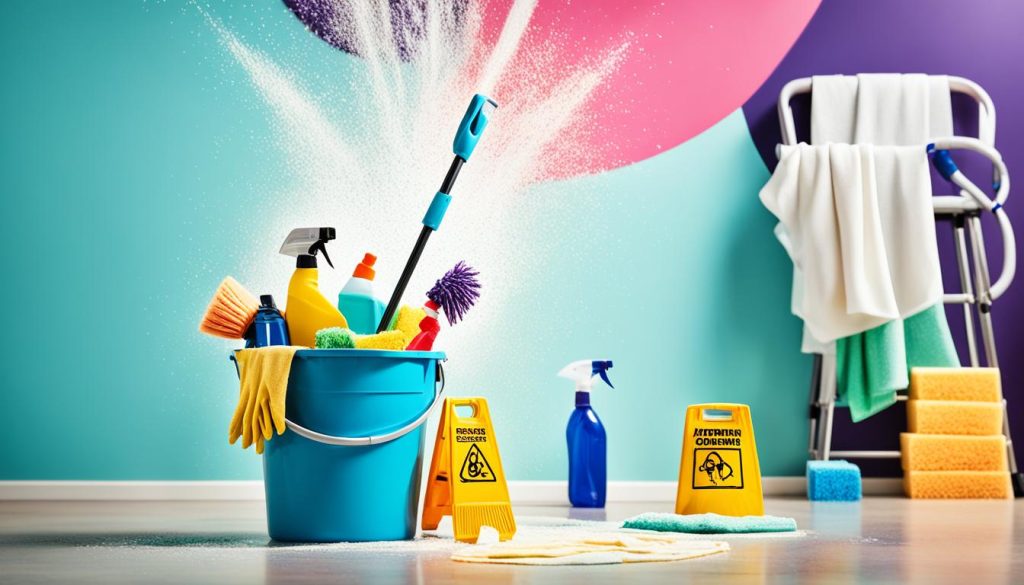
Starting a cleaning business is full of opportunities, but you need to know the basics to succeed. First, figure out why you want to start this business and how it fits with your goals. This will give you the confidence you need to begin.
Think about what cleaning services you want to offer. You could focus on homes, businesses, or special types of cleaning. This decision will shape your business plan.
Key Considerations
Looking into the cleaning industry basics means checking your skills and what you have to start. It’s also vital to know if people in your area need cleaning services. Having something unique to offer can set you apart from others in the market. Important things to consider include:
- Identifying your target client base
- Researching competitors in your area
- Analysing the types of services that are in high demand
These points help you prepare thoroughly for the challenges of starting a cleaning business locally.
Understanding the Cleaning Market in Italy

The cleaning market in Italy has changed a lot in recent years. This change is due to the economy and what people want more of. It now includes many types of cleaning like home, business, and special services for industries and after events.
Now, there’s a big push for eco-friendly cleaning products. People care more about the planet, so companies are changing too. They’re using green practices to stand out in the market.
Home cleaning is still strong because people are busy and like to pay others to clean. Business cleaning is also in demand. Companies want to stay clean and safe, especially with health worries around the world.
Knowing how the cleaning market in Italy works is great for new businesses. By keeping up with what customers want and new trends, companies can grow in this big market.
Legal Requirements for Operating a Cleaning Business
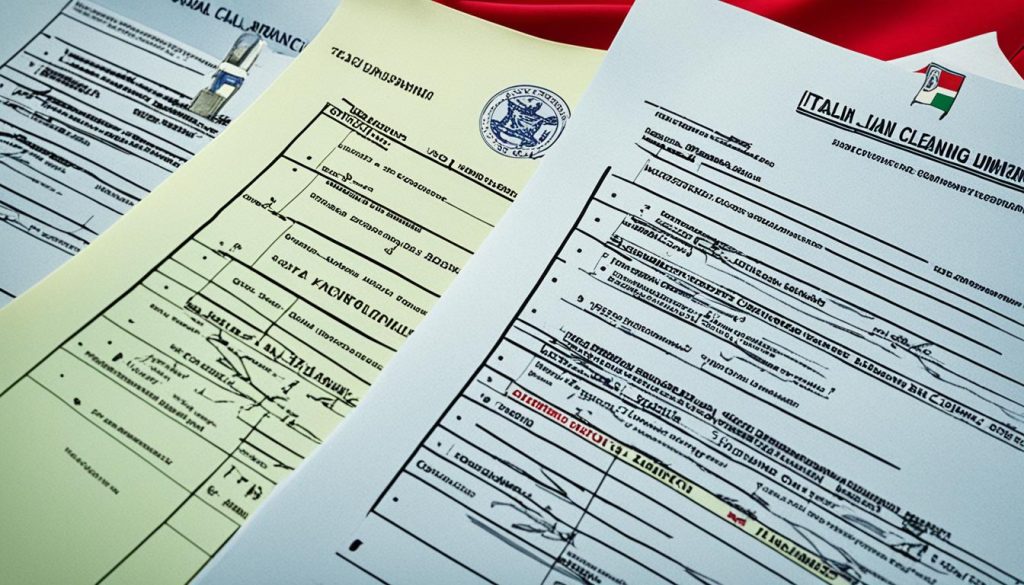
Starting a cleaning business in Italy means you must follow certain laws and rules. You need to register your business with the local chamber of commerce. This is key to following Italy’s rules.
You must get the right licences and permits for cleaning work. These can change depending on where you are. Talking to local authorities can help you understand what you need. It’s also vital to know about labour laws, especially about contracts and workers’ rights.
Having insurance is a must for a cleaning business. It covers you against claims for accidents or damage during work. Not having enough insurance could cost you a lot of money.
The General Data Protection Regulation (GDPR) sets strict rules for handling personal data. Cleaning businesses must keep client and employee data safe and secure. This keeps you in line with the law and builds trust with your customers.
Taxes are a big part of running a cleaning business. It’s important to understand Italy’s tax laws. Getting advice from a tax expert can help you stay on the right side of the law.
Crafting a Business Plan for Your Cleaning Business
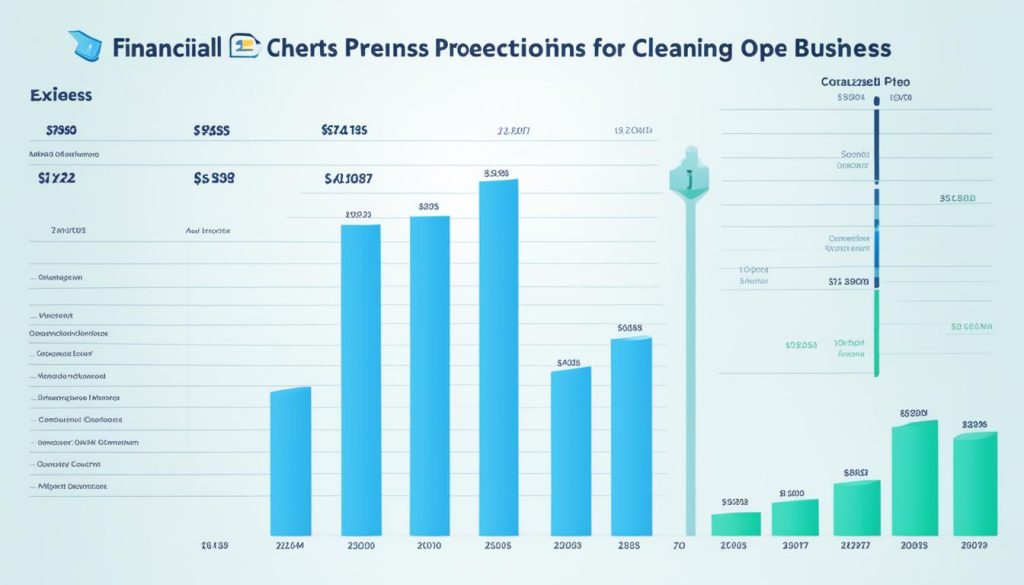
A well-structured business plan is key for any cleaning business. It acts as a roadmap and a tool to draw in investors. Start by setting out your vision and mission. This guides your cleaning business strategy and keeps it in line with your long-term aims.
Doing a market analysis is crucial. Know who your target market is, including their likes and dislikes, and look at your competitors. Make plans for how you will run your business, including who you will hire, what services you will offer, and how daily operations will work. It’s vital to think about potential problems and how you’ll solve them.
Marketing strategies are vital in your business plan. Figure out how you’ll reach customers and promote your services. Include both online and offline methods that fit with current trends. Your financial forecasts should cover costs, expected earnings, and profit margins. Setting realistic goals helps you track progress and see how successful you are over time.
Following these tips will give you a clear view of your cleaning business. A detailed business plan boosts your operations, helps secure funding, and sets the stage for growth and lasting success.
Choosing Your Cleaning Services: Residential vs Commercial

Deciding what cleaning services to offer is key to your business’s success. You have two main options: residential and commercial cleaning. Each type caters to different clients and needs. Knowing these differences helps you target and market better.
Residential cleaning is for homes and apartments. Clients here want regular, deep, or special cleaning like carpet care. It’s important to listen to what homeowners want and be flexible to keep them happy.
Commercial cleaning is for offices, warehouses, and other business places. Clients here need services that fit their strict schedules and standards. This includes window washing, floor care, and keeping workspaces clean. Knowing what businesses need can help you secure ongoing contracts.
- Benefits of Residential Cleaning:
- More frequent client interaction and flexibility in scheduling.
- Opportunities to build long-term relationships with clients.
- Challenges of Residential Cleaning:
- Variability in client expectations and preferences.
- Potential for lower profit margins compared to commercial contracts.
- Benefits of Commercial Cleaning:
- Higher profit potential through service contracts.
- Consistent work and scheduling opportunities.
- Challenges of Commercial Cleaning:
- Need for compliance with industry regulations and standards.
- More competitive bidding processes for contracts.
Residential and commercial cleaning both have their pros and cons. Tailoring your services to each segment can make your business successful in Italy. Offering flexible services, like deep cleaning or special tasks, can draw in more clients.
Identifying Your Target Audience

Knowing who your customers are is key for any cleaning services business. It’s crucial for making marketing work well. By doing deep market research, you can find out who needs your services the most.
Start by looking at demographics like age, job, and lifestyle. For homes, think about families or people who are always busy and need quick cleaning solutions. They might be looking for ways to save time and keep their places clean.
For businesses like offices or shops, things are a bit different. They might want cleaners they can count on and who can keep up with their cleaning needs. By knowing these differences, you can make sure your marketing hits the mark for each type of customer.
Having a clear idea of your audience helps make your marketing stronger and your customers happier with your services. It helps you improve your offerings and grow your business in a healthy way.
Setting Competitive Pricing for Your Cleaning Services
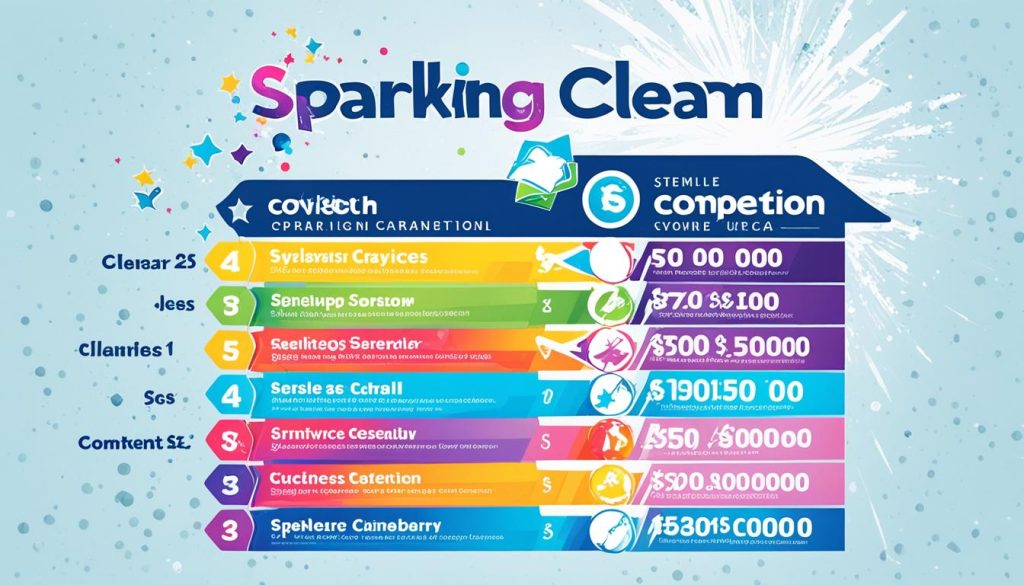
Creating a solid pricing strategy is key for your cleaning business. It’s important to understand and use competitive pricing to boost your success. Start by looking at what your competitors charge and the services they offer. See how they price their services and what makes them stand out.
When setting your prices, think about these things:
- The average rates for similar cleaning services in your area.
- Your costs, like supplies, equipment, and overheads.
- What your target customers need, as some may pay more for custom services.
You can price your services in different ways, like by the hour or a flat fee. Hourly rates are good for small tasks or when you’re not sure how long it will take. Flat fees are great for clients who want a simple, clear price for cleaning services.
Don’t forget to consider prices for special services, like deep cleaning or cleaning after renovations. These services usually cost more because they require extra skills and time.
Being clear about your prices builds trust with customers. Giving detailed estimates and invoices can make customers happier and more likely to come back. Also, offering extra services, like eco-friendly cleaning or same-day service, can make you stand out in a crowded market.
Finding Suppliers for Cleaning Products and Equipment
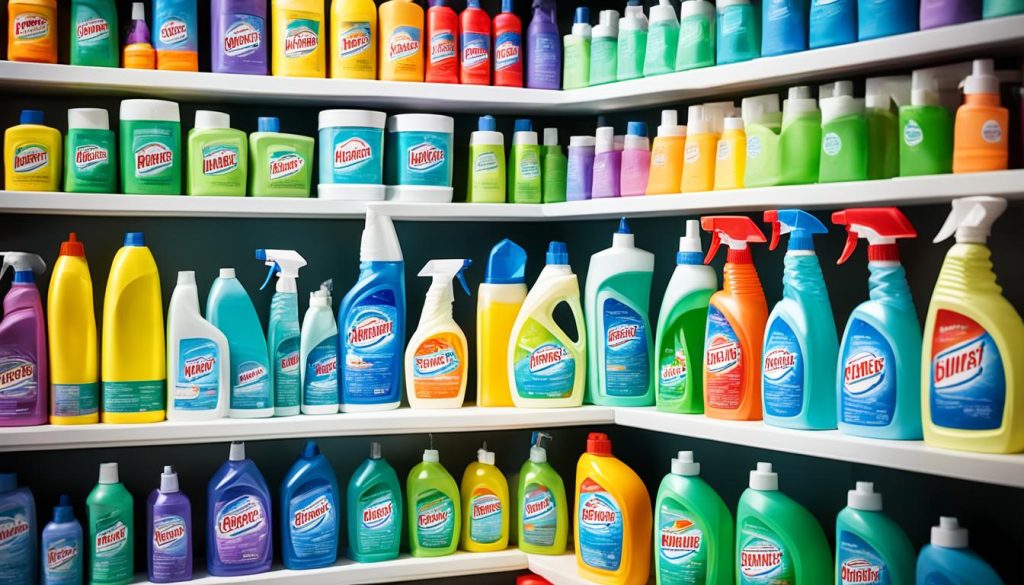
Finding good cleaning supplies is key for a cleaning business to do well. It makes sure the work meets what clients expect and keeps things running smoothly. When looking for equipment, think about what makes a good supplier.
First, check how reliable suppliers are. Look at reviews, what customers say, and their history with quality and service. A supplier that always gives top-notch cleaning supplies at good prices is a big plus for your business.
Also, think about products that are good for the planet. Many suppliers have green options that work well but are easy on the earth. This can make your business look better and draw in more customers who care about the environment.
Having a strong relationship with suppliers has lots of perks. You might get lower prices, special deals, and fast service. Talking often with suppliers can also help you get better deals and make sure you always have what you need.
- Evaluate suppliers based on reliability and product quality.
- Consider sustainable options for eco-friendly services.
- Establish long-term relationships for better pricing and service.
Marketing Strategies for Your Cleaning Business
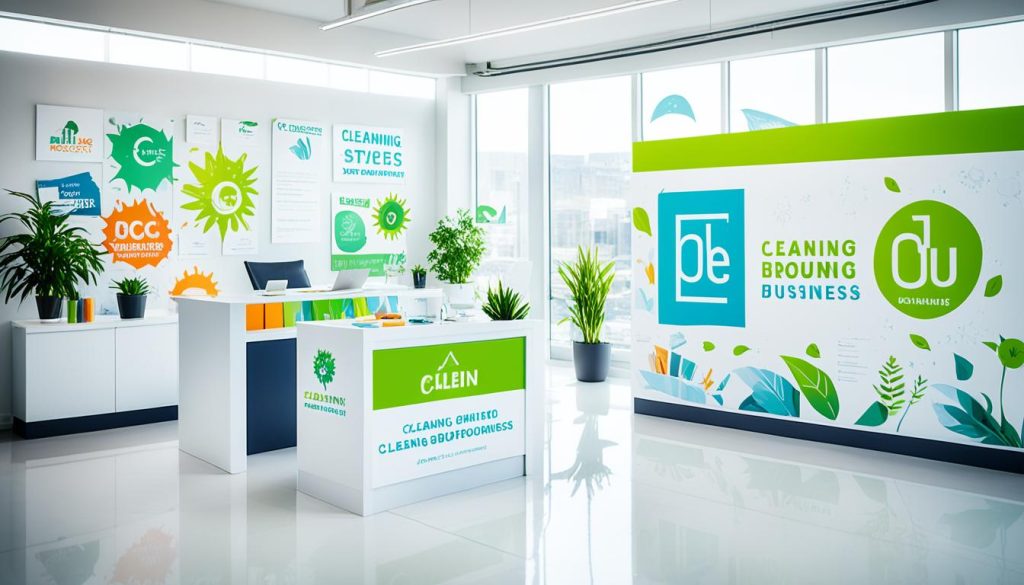
For a cleaning business to succeed, it’s key to use effective marketing strategies. A mix of old and new marketing methods helps get your business noticed and brings in new customers.
Here are some ways to promote your cleaning business:
- Flyers and Local Advertising: Hand out flyers in local areas or post ads in community spots to grab people’s attention and get them interested.
- Social Media Engagement: Use Facebook and Instagram to show off what you do, share happy customer stories, and talk to your followers.
- Search Engine Optimisation (SEO): Make your website easy to find by using the right keywords. This helps people looking for your services find you online.
- Email Marketing: Keep customers in the loop with emails about new deals or services. This can help you get more repeat business.
Having a strong online presence is also important. Having a professional website, being active on social media, and getting good reviews from happy customers can all help improve your brand’s image.
The Importance of Branding Your Cleaning Business
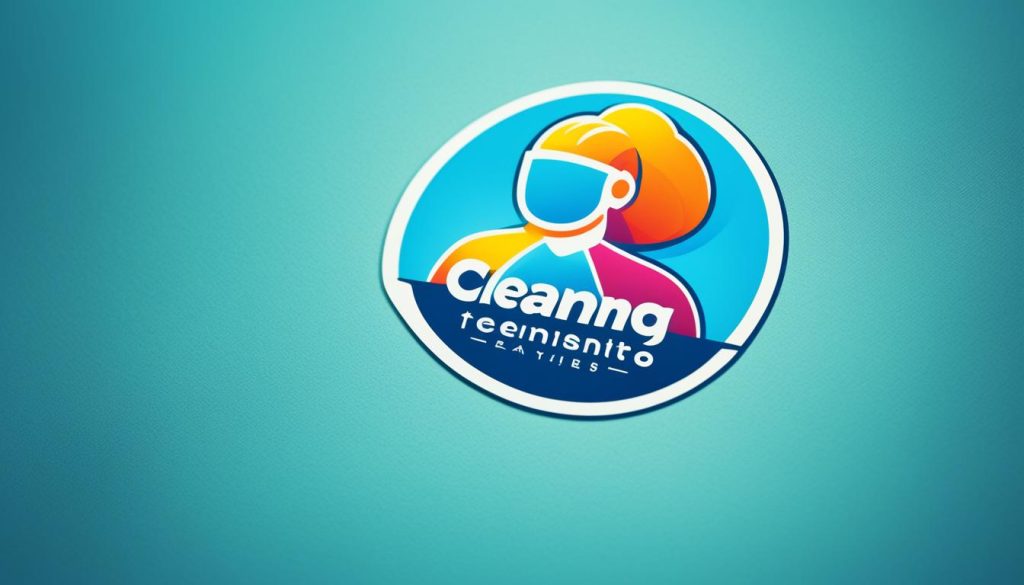
Having a strong brand is key for any cleaning business. It makes your services stand out and shows you’re professional. Think about these key parts when building your brand:
- Logo Design: A good logo makes your brand easy to remember.
- Colour Schemes: Choose colours that suggest cleanliness and trust. These can shape how clients see your business.
- Brand Messaging: Create messages that speak to your audience. They should reflect your business’s values and what you promise.
Being consistent with your branding is vital. Your customers should see your brand’s identity everywhere – on social media, your website, and in ads. This consistency builds recognition and trust, which leads to more loyal customers.
Putting effort into your brand helps you stand out in the market. A strong brand makes your business more attractive to potential clients. It sets you apart from others in the industry.
Utilising Online Platforms for Business Promotion
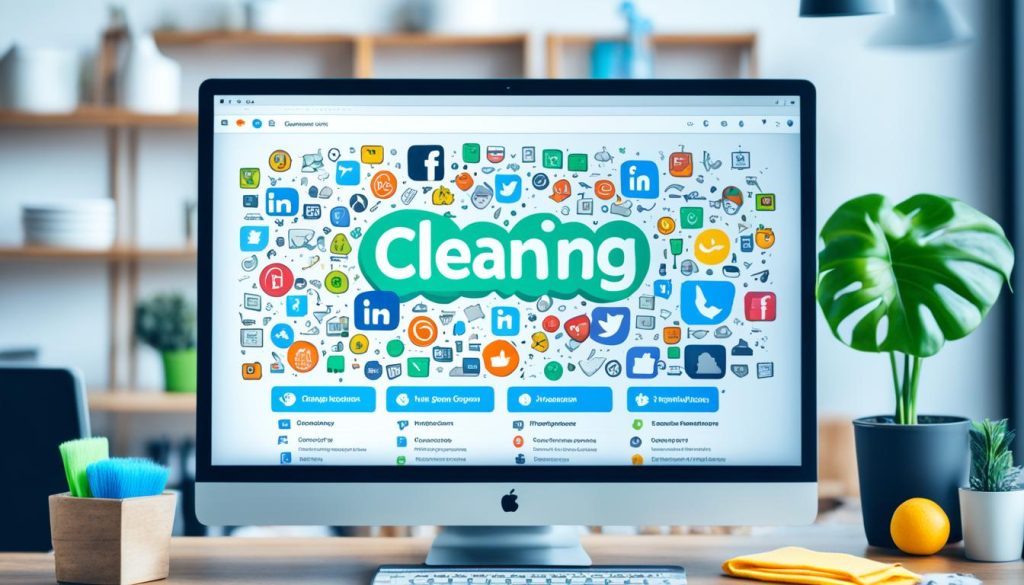
Today, using online platforms is key for promoting a cleaning business. Sites like Facebook and Instagram are great for connecting with potential customers. They let you share eye-catching photos of before-and-after cleaning jobs.
Online directories and local marketplaces also help a lot. By having profiles on Yelp or Google My Business, people can easily find your services. Keeping your contact info and service details current makes these directories more effective.
Using digital marketing, like targeted ads, can really grow your business. By targeting specific groups of people, you can reach those who need cleaning services. This way, your marketing works better and brings in more customers.
To sum up, using online platforms well means engaging on social media, listing in directories, and using targeted digital marketing. This mix helps get your cleaning business noticed and brings in new customers.
Hiring and Training Employees for Your Cleaning Business

Building a successful cleaning business relies on hiring staff who are skilled and fit your company’s culture. Start by listing the qualities you want in employees. Look for those with cleaning experience, a keen eye for detail, and a strong work ethic. To attract the right candidates, post job ads on trusted websites and network in your community.
Before hiring, do thorough background checks on applicants. These checks help ensure new staff are trustworthy, which is key to keeping your clients happy. Once you’ve found the right people, focus on training them well. Teach them about cleaning methods, how to use products, and how to serve customers well. This makes sure they’re ready and confident in their jobs.
Creating a positive work culture helps keep employees engaged and happy. Encourage them to talk openly, offer chances for learning new skills, and celebrate their successes. This not only helps your employees grow but also keeps them with your business, which is good for your success.
Creating a Customer Care Strategy

Creating a strong customer care strategy is key for building lasting cleaning business relationships. It starts with knowing what customers need and expect. By listening to feedback through surveys or direct talks, you can spot areas to improve your service.
Quickly solving complaints can change a bad experience into a good one. Make a clear plan for dealing with problems, so clients feel important and heard. It’s also vital to tell customers how you fixed their issues and check if they’re happy.
Loyalty programmes are great for keeping customers coming back. Offering special deals, rewards, or unique services to regulars makes them want to stay with your business. Keeping in touch through newsletters or personal messages keeps clients interested and updated on new services.
Keeping in touch and following up regularly boosts customer happiness. A focused customer care strategy helps your cleaning business keep clients and draw in new ones through good word of mouth.
Managing Finances and Bookkeeping for Your Business

Effective financial management is key for a cleaning business’s success. Keeping accurate records of income and expenses is vital. Understanding your finances well lets you make smart choices. Here are some important tips:
- Budgeting: Create a budget that’s realistic with expected income and expenses. Update it regularly to adjust to new situations.
- Expense Tracking: Keep detailed records of all costs, like supplies, wages, and overheads. This shows where you can cut costs.
- Invoicing: Use a standard invoicing system. Sending invoices on time helps with cash flow and keeps payments steady from clients.
- Tax Obligations: Know the tax laws that affect your business. Keep accurate records to avoid fines.
- Financial Statements: Check your income statements and balance sheets often. They give you a clear view of your financial health.
- Hiring an Accountant: Think about getting a professional if managing finances is too much. An accountant can offer great advice and improve your financial plans.
Using these financial management tips will make your cleaning business stronger for the future. It sets a strong base for growth and lasting success.
Expanding Your Cleaning Business in Italy
After setting up a strong base for your cleaning business in Italy, it’s time to grow. You should look into different ways to expand. Adding special services like eco-friendly cleaning or cleaning after renovations can help. This way, you can reach more customers and enter new markets.
Franchising is another great way to grow your business. It lets you use your brand while others run it locally. This helps you reach more places and get your brand known better. Working with local businesses, like estate agents or property managers, can also bring in more customers and make your service more trusted.
When thinking about growing, check how well your business is doing. Look at important numbers to see where you can grow more. Getting ready for more customers means making your business run smoothly and keeping quality high. With these steps, you can grow your cleaning business in Italy’s competitive market.









